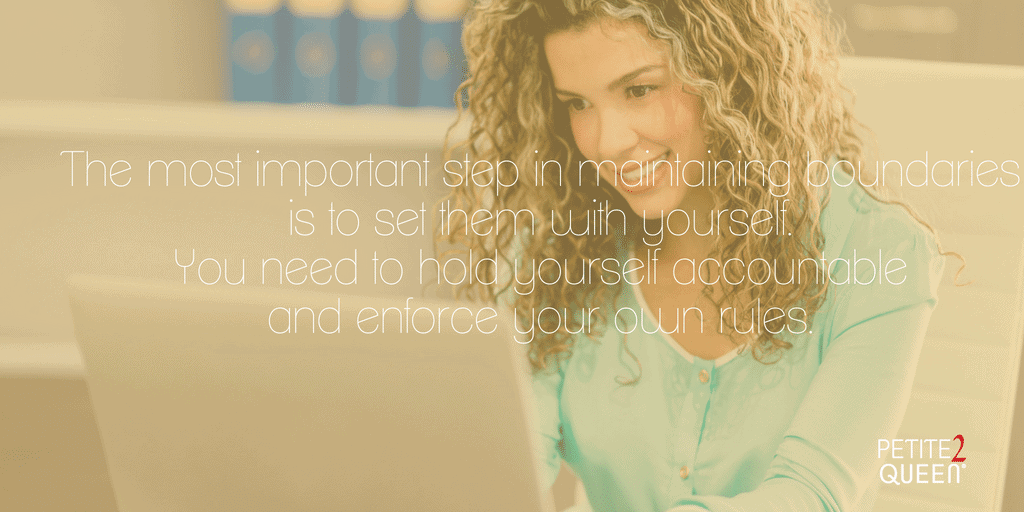A lesson many of us learn early in life is to set boundaries. That may mean drawing a line when you need time alone or being clear about things you aren’t comfortable saying or doing. Knowing what your boundaries are often comes from understanding your values and priorities. Setting boundaries is a necessary aspect of life – for yourself and for any relationships you have – but it’s also vital in your career.
How do you maintain work-life balance? How can you keep control over how and where you spend your time throughout the day? It all comes from the boundaries you set. Without them, you can end up feeling overworked, stressed, and resentful. But if you learn how to make boundaries and communicate them to those around you, you’ll have taken an important step forward in managing your time.
Working Too Much (And Too Late)
Several years ago, my friend Mariah started working at a new company, where she reported directly to the CEO. She was excited about her new position and was determined to work hard and make a good impression on her boss. There was always plenty of work to do, and she regularly responded to emails and attended meetings late into the evening. She even worked on most weekends – not because she was asked to but because she felt it was important for her job performance.
Her boss was impressed with her work, but Mariah began feeling more and more drained. Mariah had little time for her family and friends, let alone any hobbies. She started rebelling from her self-imposed schedule, occasionally declining very late meetings with an apology and an excuse. Eventually, though, she figured out that she needed to set some clear boundaries. She spoke to her boss, explaining that she would need to stop working by 6:00 each evening – unless something critical came up – and would no longer be available over weekends. Her boss understood, and swiftly stopped emailing her outside of those working hours.
Many of us are just like Mariah. We feel like we need to work at any and all hours, on weekends – even while on vacation! And the thing is, if you make it clear that you’re available to work at these times, your colleagues will become used to it. They’ll expect you to be working, and they’ll keep sending emails and setting up meetings with the understanding that you’ll be there. It’s not malicious on their parts; they’re just responding to the boundaries you set. If you want to have your evenings and weekends free, you need to make it clear that you don’t work at those times.
Setting Boundaries at Work
That can be a little scary for many of us. We don’t know how to establish these boundaries, and even if we do, we worry that it will negatively impact our jobs. Will my boss be mad if I’m not available to work late anymore? Will I get fired? Most of us want to not only keep our jobs, but also perform well at them. We want to be star employees. We want to prove that we’re reliable, hardworking, and worthy of that promotion or raise.
Nerve-wracking as it may be, don’t worry about that. First of all, what matters isn’t how much you work (beyond your standard 40 hours a week, at least); you don’t need to be available all the time. What matters is how effective you are while you do work. Use your normal working time wisely and efficiently. If you do, you are less likely to need to work overtime and at crazy times of the day.
Secondly, people actually perform better when they take breaks, take time off, and manage their time well. Work smarter, not harder. It’s not healthy to be a workaholic, but it’s also not even good for your job performance. Setting boundaries will actually make you a better employee.
Let your boss know if you have a hard stop time each day. It’s okay if you want to mention that you need to pick up your kids from school or have a book club you attend each Wednesday. But it’s also okay to leave it at that. Don’t provide unnecessary details. Simply establish a clear schedule and stick to it. You may also want to tell your co-workers so there’s not confusion.
Setting Boundaries with Yourself
Even after you’ve told your boss that you plan to leave work on time each day, the most important step in maintaining boundaries is to set them with yourself. You need to hold yourself accountable and enforce your own rules. For many of us, this can be surprisingly difficult.
About a year ago, I found that I was consistently working past 6:00 each evening. I wanted to end my workday by 5:00, but I was no good at sticking to my own schedule. So how did I finally succeed in enforcing my schedule? I did two things: First, I told my boss that I would have a hard stop at 5:00 each day. She was very understanding and made sure to not schedule meetings too late or send emails to me after 5:00. Second, I signed up for a few classes at the gym which start at 5:45. Because of when they start, I need to stop working on time in order to make it to the gym.
My sister, who also works here at Petite2Queen, has worked hard to set her own boundaries, too. She divides her time between work and a PhD, but she’s also living in Ireland, meaning she’s 8 hours ahead of the rest of the team. We all try to be respectful of her schedule, though sometimes I slip up. A few days ago, she sent me a message on Facebook (our primary point of contact) asking me not to send her any more work-related messages after her workday ends. I happily obliged, even as I continued working for another 4 hours.
Tips & Tricks to Keep You on Track
Maintaining your newly set boundaries can be hard at first. How can you make sure you follow your own rules?
My #1 tip is to disconnect. When I’m not working (any time after about 5:00 pm; on weekends; while on vacation), I do not check my work email at all. I don’t have it set up on my phone, and I don’t open my computer to log in to my work email. I know that if I see it, I’ll either feel the need to start working or I’ll become stressed about something when I should be enjoying my time off. My sister and husband both follow the same rule, and it works well for them. Maybe America should try out France’s new “right to disconnect” law and disallow work emails after hours?
Note: In case of emergency, make sure you’re reachable in another way – via phone, for example.
Another way to keep you on track is to schedule in vacations. Take time off regularly. If you have paid vacations, be sure to always use them! If your vacations are unpaid, you’ll have to consider what you can afford, but do take time off when you’re able to. It’s important to recharge and focus on other aspects of your life.
Finally, make the most of your worktime by establishing the opposite boundaries: Minimize interruptions while you are working! I work from home, and I have a few people who want my attention even during my work hours (my sister, my husband, my cat). I occasionally remind them to please be mindful of my schedule. Two of them get it for the most part; my cat refuses. If the people in your life understand your availability, you’ll be able to give your focused attention to the tasks and people who need it.
Time is Precious
We’re all busy, and time is precious. Boundaries are vital in work as well as other aspects of your life. Indeed, setting boundaries is a key part of self-care, work-life balance, and maintaining a sense of control over your time. By establishing and communicating your boundaries, you’ll minimize stress and maximize your time, leaving you feeling happier and more efficient. It’s never too late to set or reestablish your boundaries, so find what works for your and put it into practice. You got this!
Petite2Queen provides virtual mentoring to young women in life, at work, and in sales. Follow us for more practical advice you can put to use to improve your life and career.

Amanda Whitbeck is Vice President of Operations at Petite2Queen. Since earning her master’s degree in Global Entertainment & Music Business from Berklee College of Music, Amanda has played key roles facilitating growth at start-ups. She’s also worked in diverse sectors of the music industry, from live events promotion to entertainment journalism. She brings her expertise in music business, writing, and website development to Petite2Queen.



